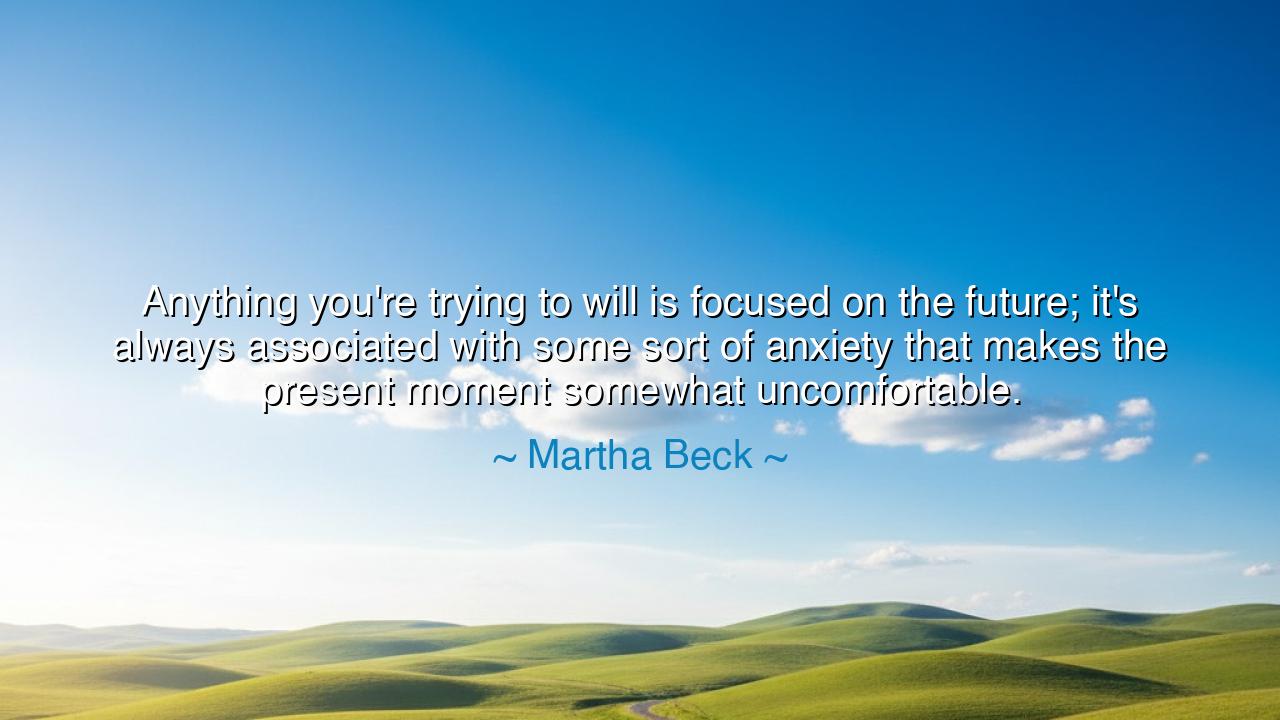
Anything you're trying to will is focused on the future; it's
Anything you're trying to will is focused on the future; it's always associated with some sort of anxiety that makes the present moment somewhat uncomfortable.






On the Weight of Will and the Freedom of the Present Moment
When Martha Beck said, “Anything you’re trying to will is focused on the future; it’s always associated with some sort of anxiety that makes the present moment somewhat uncomfortable,” she was not speaking against ambition or desire — she was unveiling a deeper truth about the nature of will, time, and the restless human heart. Her words invite us to see the subtle prison we build when we try to force the future into existence, when our longing for control pulls us away from the sacred stillness of the present. Beneath her simple phrasing lies an ancient wisdom: that the harder we clutch at what is not yet, the further we drift from what is.
To “will” something, in its essence, is to summon energy toward a desired outcome — to shape the unseen into the seen. Yet, when that will becomes overbearing, when it is rooted in fear or obsession, it transforms into anxiety, the shadow of hope. Beck reminds us that this anxious will is always directed toward the future, toward something that has not yet come to be. The mind, racing ahead, leaves the heart behind, and the present moment — the only moment that truly exists — becomes a place of discomfort, impatience, or neglect. Thus, our willing becomes our undoing.
The ancients spoke of this same struggle in their own language. The Stoic philosopher Epictetus taught that peace is found not by trying to control the world, but by aligning oneself with its flow. “Do not seek for things to happen as you wish,” he wrote, “but wish for things to happen as they do.” What he meant — and what Martha Beck echoes — is that when we abandon the illusion of control, we rediscover harmony. The future, after all, is not a realm to conquer, but a seed that grows naturally from the soil of the present. The anxious will is like a gardener who tugs at a sprout to make it grow faster — destroying what patience would have perfected.
History offers countless examples of this truth. Consider Alexander the Great, whose boundless will carried him to the edges of the known world. He conquered kingdoms, bent nations to his command, and achieved what many would call immortality. Yet his victories brought him no peace. Even as he stood at the Indus River, master of all he surveyed, he wept — for there were no more worlds to conquer. His will, forever reaching forward, had robbed him of the ability to rest in the present moment. His anxiety was not born from failure, but from the endless hunger to shape the future. The lesson of his life — like the lesson of Beck’s insight — is that mastery of the world is hollow without mastery of the self.
To live always in the future is to live in exile from one’s own soul. The anxiety Beck describes is not merely emotional; it is spiritual dislocation. When we dwell in what has not yet come, we fracture the unity of time — our bodies remain here, but our minds wander far ahead, chasing illusions. The great teachers of all traditions have warned of this. The Buddha taught that suffering arises from attachment — from wanting things to be other than they are. Jesus said, “Do not worry about tomorrow, for tomorrow will worry about itself.” Both call us back to the same truth that Martha Beck rearticulates in our modern tongue: that peace is found not through the conquest of time, but through its surrender.
And yet, this does not mean that we should abandon our dreams or cease striving altogether. The wisdom lies not in rejecting will, but in tempering it with presence. To work, to build, to hope — these are noble acts when they arise from joy rather than fear. The key is to release our desperate grip on outcomes, to labor faithfully in the present and trust that the future will unfold as it must. When we live this way, the present moment ceases to feel uncomfortable. It becomes alive with meaning, because we are no longer trying to escape it.
The lesson, then, is this: do not will the future — become the present. Whatever you seek to create, do it with calm awareness rather than anxious striving. When you find yourself tensing over what has not yet come, pause. Breathe. Return your attention to what is before you. Every great destiny begins with a single, mindful step taken now. The future you long for is not separate from this moment; it is born from it.
Thus, in the words of Martha Beck, we find a gentle but profound reminder: that the true art of living is not in the mastery of time, but in the surrender to its flow. The anxious will seeks to bend the world — but the wise soul walks with it. In letting go of the desperate need to control tomorrow, we reclaim the only thing that ever truly belongs to us — this breath, this moment, this living now, where the seeds of eternity quietly take root.






AAdministratorAdministrator
Welcome, honored guests. Please leave a comment, we will respond soon